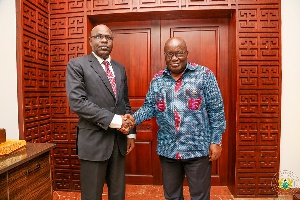 President Akufo-Addo with Lt Gen Salou Djibo
President Akufo-Addo with Lt Gen Salou Djibo
The President of the Republic, Nana Addo Dankwa Akufo-Addo, has stressed the critical importance the regional market of ECOWAS represents to the development of West Africa, stating that “it has to be a very fundamental objective of all of our peoples and governments in the region.”
According to President Akufo-Addo, with West Africa’s population set to hit 500 million people by 2035, the region represents a genuine market with immense opportunities for trade, enterprise and ingenuity. He has, thus, highlighted Ghana’s commitment towards facilitating efforts at regional integration and unity.
With ECOWAS having been established some 42 years ago, and trade liberalization agreements being in existence for nearly 40 years, West Africa is yet to reap the benefits if intra-regional trade because, in the view of the President, “the political will to make ECOWAS a functioning reality is not there.”
Statistics indicate that intra-regional trade between members of the European Union (EU) and ASEAN amount to some 60% to 70% of GDP, whereas intra-regional trade in West Africa and the African continent amount to a paltry 10% to 11%
“Despite the difficulties the EU is having, there is no doubt the EU has been a major benefit to the growth and development of the economies in Europe. Overall, the picture of Europe now is radically different from what we used to know in our youth,” he said.
President Akufo-Addo made this known on Friday, April 28, 2017, when the head of the Task Force for the implementation of the ECOWAS Trade Liberalisation Scheme (ETLS), Lt. Gen. Salou Djibo, who is also the former President of Niger, paid a courtesy call on him at the Presidency.
In his remarks, Lt. Gen. Salou Djibo explained that the ETLS, which was established some 39 years ago, is the main ECOWAS operational tool for promoting the West Africa region as a Free Trade Area.
With low volumes of intra-trade being recorded amongst West African countries, the head of the ETLS noted that “charity must begin at home. We cannot be trading with others, whilst abandoning our own. It is for this reason that ECOWAS, in March 2014, endorsed a taskforce to move around the region to identify the hurdles and challenges stifling free trade, so we can create wealth for our people.”
Gen. Salou Djibo revealed that the Task Force has so far visited Cote d’Ivoire, Benin, Togo, Liberia, Burkina Faso, and was encouraged with the progress made so far in ensuring the realization of the Free Trade Area in West Africa.
“We have come to thank you for your vision. We know that you are one of those who has spoken about the integration of West Africa. During your election campaigns, you spoke about the reasons why people must come together beyond the boundaries, and bring West Africa to a solid foundation that recognizes the black man and enterprise in creating wealth,” he said.
He urged President Akufo-Addo to support the mandate and agenda of ETLS, and serve as an advocate for the Task Force in ensuring that his colleague Heads of State adhere to the implementation and realization of the Free Trade Area.
On his part, President Akufo-Addo applauded the initiative of the setting up of the ETLS Task Force to monitor the compliance of ECOWAS member countries.
“Ultimately, the concept of large trading blocs has to be the way of the future, and, we, in West Africa, will not be able to escape the pressures of history. We will have to find ourselves within it,” he said.
With Ghana being the second largest contributor to ECOWAS, President Akufo-Addo maintained that Ghana’s commitment to ECOWAS is unambiguous.
“From the first day till today, we have been a firm supporter of ECOWAS’ initiatves, whether it is in the area of security, Ghanaian troops and diplomacy, have been very much at disposal of ECOWAS in resolving security issues – Liberia, Cote d’Ivoire, Guinea Bissau, Sierra Leone – across the length and breadth of the region. In the Gambia, which is the latest one, Ghanaian troops, again, were present,” he said.
He pledged his and the support of Ghana towards the Free Trade Area, and was unequivocal that the Task Force, headed by Gen. Salou Djibo, would succeed in their efforts.